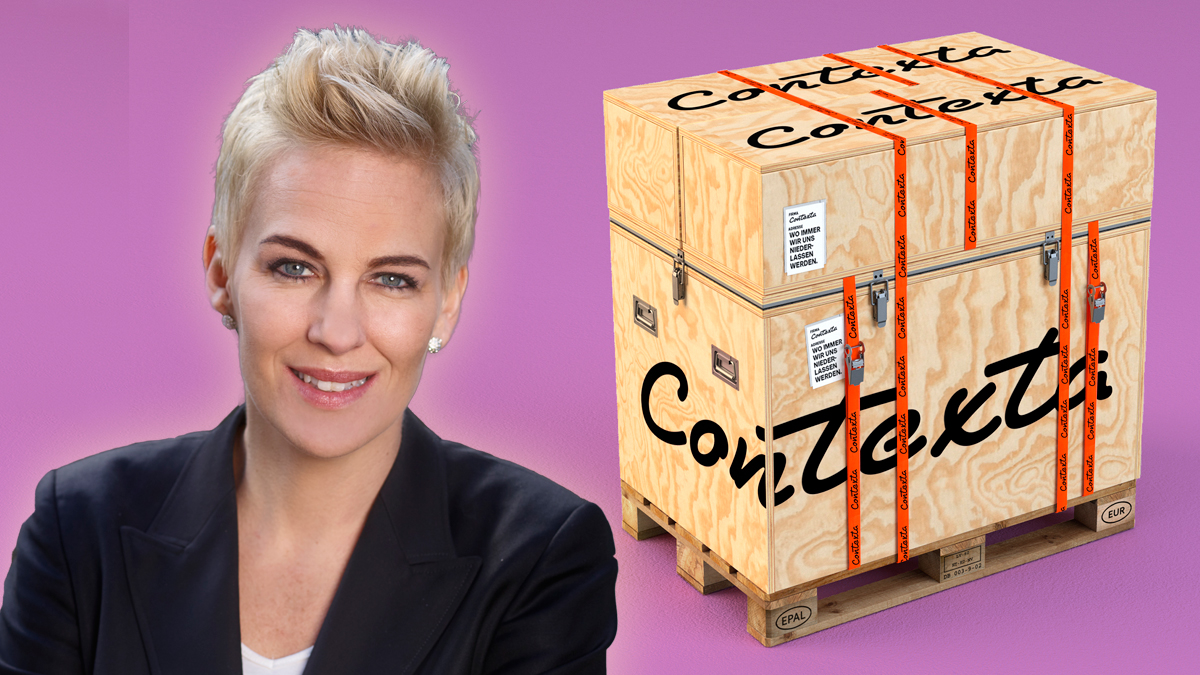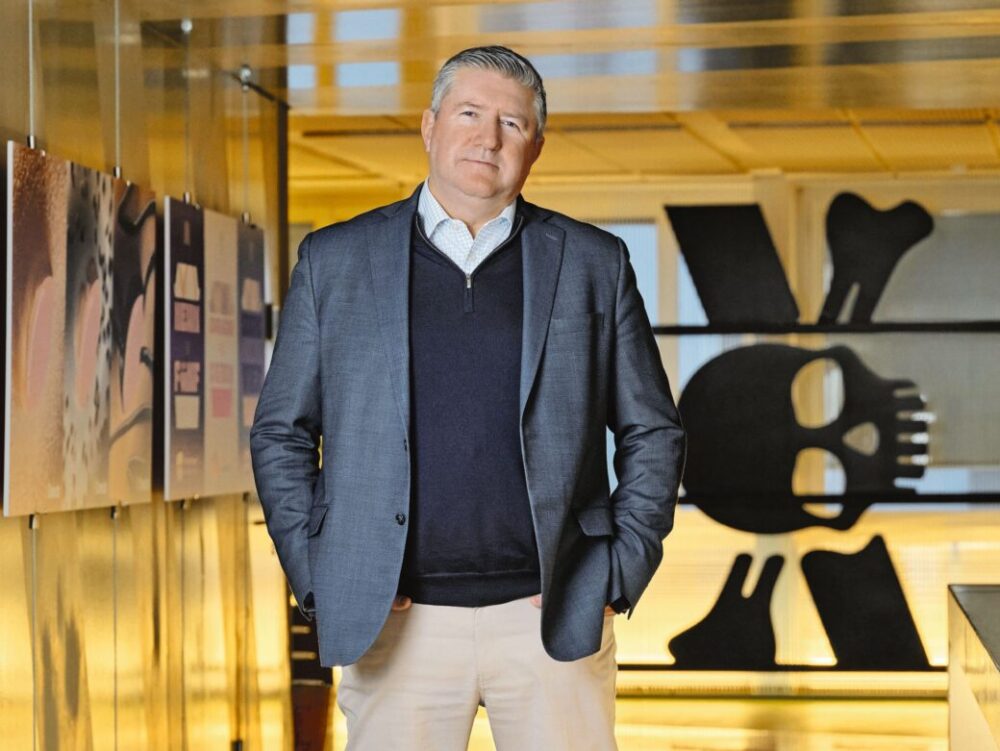"The physical dissolution of the agency is now simply the final step - that's obviously something to talk about"
Contexta is leaving Bern and plans to move around Switzerland without a fixed base in the future. Owner Nadine Borter explains in an interview with Werbewoche.ch how the concept works.

The agency Contexta from Berne has made a significant contribution with the BZ Bernese Newspaper and published on Monday recorded by Werbewoche.ch News that she would be leaving the capital and practicing "urban nomadism" in the future caused quite a stir - in the newsletter of MK Advertising Week Expodata the article was the most clicked since the launch in January 2019. Reason enough to ask owner Nadine Borter what's behind the concept.
Over 50 years in the game - but soon no more direct access to the Aare: after half a century of agency history, Contexta is embarking on a completely new path.
Werbewoche.ch: Nadine Borter, what prompted the agency to abandon the concept of a fixed location and move every two to twelve months in the future? What fundamental advantages does the concept promise?
Nadine Borter: We already started restructuring the agency two years ago. We felt that the classic agency model was no longer viable for us. The physical dissolution of the agency is now simply the last step. The most visible one is, of course, something to talk about. The idea is that as a mobile agency we can go to the places that are close to people, that animate and enrich us: an outdoor pool, a café, the Langstrasse. These places are sources of inspiration for us. Here we always come across fresh insights. When life happens right outside the agency door, we no longer need focus groups to uncover human truths.
Who or what decides when and where to move?
We follow life. To find inspiration, we go where life plays. That can be anywhere and has nothing to do with a specific city. We start in Zurich. We decided this as a team, and we will keep it that way in the future.
Is that a novel concept in the Swiss communications industry? How did you come up with it?
We are not aware of any comparable agency concept. However, we were inspired, among others, by the Danish mastermind, permanent traveler and bestselling author Martin Lindstrom. He said the sentence: "If you want to know how animals live, you shouldn't go to the zoo, but to the jungle."
How does a long-established Bernese agency get the idea to turn its back on Bern - at least for the time being? Does the Bernese market offer too little growth potential?
For the last 50 years, we have been a Berne agency serving national clients. So for us, the advertising market is not a Bernese market, but at least a national market. We are deciding to take this step from a strong position, and we are very excited about it. In fact, it is an investment in the future and not an exercise in saving money.

If the agency is no longer a Bern agency in the future - what should it be called?
We do not deny our origin. We are simply the agency that is now on the move. We haven't thought of a name for it. But we are curious about your word creations.
How will Contexta's departure change the agency landscape in Bern?
As I said, we don't see the advertising market locally, but at least nationally. So our concept has no influence on the other agencies in Bern.
The first stop is Zurich - from the market's point of view, probably already a kind of final destination. Where should the agency move to after that? Isn't the temporary move simply a test expansion to Zurich?
Nomadism is not a fixed move. The first stop will be Zurich. We are also curious where we will be in 24 months.
Assuming that after twelve months everything is working fine in Zurich and the business is flourishing - isn't the concept of urban nomadism quickly forgotten again?
For Contexta, nomadism is not an end in itself, not an advertising idea, but a solution: it allows us to track down human truths and to rethink things with the best minds, free of ballast and uninhibited, and ultimately to reduce them to the essentials. This will not change in the foreseeable future. It is the core of the new idea.
Moves are time-consuming and tie up resources - don't you end up being busier with them instead of your actual core business?
We were lucky enough to develop Atelier Oï, a globally unique nomadic office that allows the agency to work anywhere and move on within 24 hours. But of course it's more elaborate than in the comfortably furnished comfort zone.
You first have to "arrive" at a new location, the infrastructure has to work, the team has to get to know and feel the environment, customers have to know where to find you. Is there a risk that you end up not being properly rooted anywhere and lose your local connection, for example?
The infrastructure works. We don't believe that being rooted in one place makes advertising inherently better. Quite the opposite: New places inspire, give idea and release energy. That creates many more solutions than problems.
Is the concept also a reaction to the development that long-term, loyal agency-client relationships are becoming rarer and rarer and clients are increasingly throwing together agencies for individual jobs and campaigns on a project-by-project basis?
No, our concept has nothing to do with that. We also have many long-standing relationships with Appenzeller cheese, CSS, Bell, Bank-Now, Wallis and the SBB, for example.
The concept plays into the hands of young, independent and flexible people without family obligations. Employees with care responsibilities will probably find it even more difficult to combine family and career, which is often not easy anyway. Are you confident that you can find good solutions for these employees, or will the agency end up employing only people who are flexible enough?
Commuting is part of modern working life. Until now, we had employees from Lausanne, Basel, Thun or Zurich, for example, who came to us in Berne. Of course, the new model means a change for some employees. That's why we're looking for solutions to make the transition as pleasant as possible for those with care responsibilities, for example. If you want to have the best employees, employers today must also be prepared to find creative solutions in management. Swiss policy has been lagging behind reality for a long time.
To what extent do employees also benefit from the new model?
For our employees, the creative playground will be decidedly larger and more exciting. But of course it requires curious employees who like to break with routines, think freshly and certainly take on more responsibility for their work.
Is it envisaged that the workforce will remain fixed and move together, or will the team at the new location be re-staffed with local employees?
The concept is that the whole agency with all permanent employees moves on each time. We expose ourselves as an agency to new influences in order to find solutions together. Physical presence is necessary for the cooperative, creative process.
Where should these not inconsiderable changes take the Contexta agency in the future? How and where does it want to position itself in the market?
In the employee market, we provide a home for people who draw energy from flow, who fear stagnation, whose passions make people shake their heads, who are driven. All of us at Contexta could lead teams, delegate tasks, represent in meetings - but we don't feel like it. We want to do. With this stroke of smart and creative minds, and with our radical process innovation, we are convinced we can crack all business, sales and communication problems. Even the "unsolvable" ones. Contexta remains a brand and communications agency with strategy, creation and technology. The nomadism simply allows us to get the maximum out of it.
Does an agency the size of Contexta have to radically reinvent itself today in order to survive on the market in the long term?
No. We are not taking this step because we have to, but because we want to. Because we enjoy change and generate energy and ideas from it. We believe in communication today and tomorrow.









